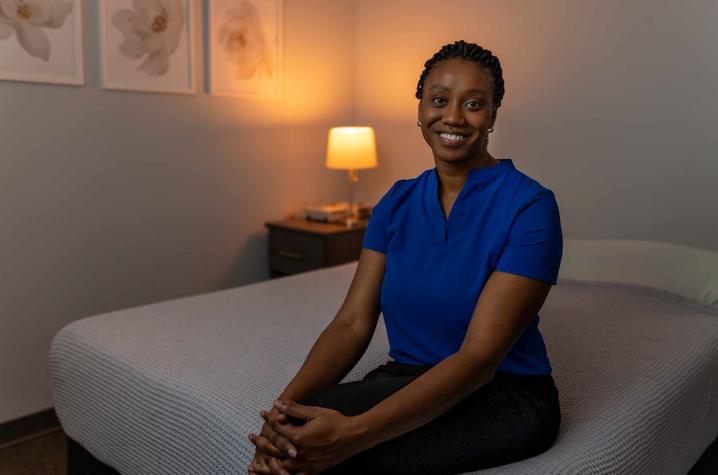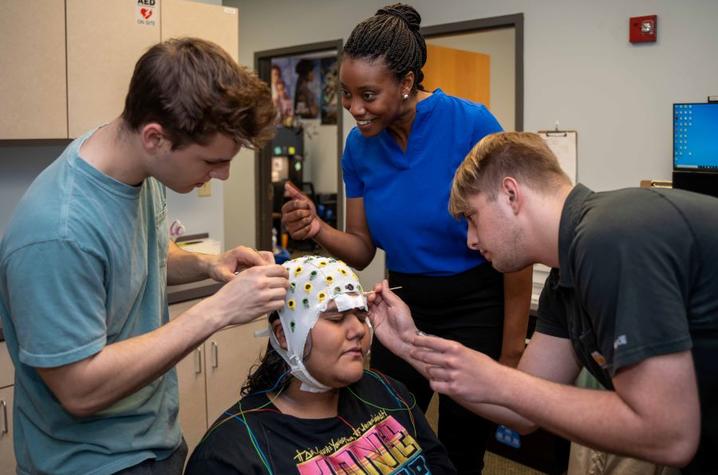People Behind Our Research: Lauren Whitehurst explores how sleep impacts health, well-being
LEXINGTON, Ky. (April 15, 2024) — Understanding how sleep helps us live healthier lives is the mission of one University of Kentucky researcher. Lauren Whitehurst, Ph.D., assistant professor in the Department of Psychology in the UK College of Arts and Sciences and assistant director of the UNITE Research Priority Area, studies how sleep is affected by our genetics and living environments.
“Before birth all the way until death, our sleep can be shaped,” said Whitehurst. “Understanding what those biological mechanisms are, as well as what those kinds of environmental and contextual factors are that shape our sleep, are the questions that I ask in my research.”
Whitehurst says sleep is one of the biobehavioral processes that impacts many disease outcomes that we consider to be preventative, or even those that we do not know answers to yet.
“Changes to sleep can predate disease by decades,” said Whitehurst. “If we really want to think about keeping people healthy, looking at and modifying sleep might be one of the ways to do that.”
Whitehurst’s current research is looking at precipitating factors that could be creating a sleep disparity in Black Americans.
“Black Americans, for example, live in neighborhoods that are noisier, have higher rates of pollution, have less access fresh food, and that all can trickle down and impact sleep,” said Whitehurst. “In our work, we try to study those effects early on, before that translates to disease to better understand how we might impact sleep in ways that can be protective across the lifespan.”
Whitehurst is also the principal investigator on a five-year $2.4 million grant from the National Institute on Alcohol Abuse and Alcoholism (NIAAA) exploring how sex and sex hormones influence the effects of alcohol on sleep quality.
“People often think alcohol is a sleep enhancer. They turn to it if they want to relax and think that it will make them sleepy. Alcohol will make you feel sleepy. However, it also disrupts the amount and the type of sleep that you get later in the night.”
The eight-hour golden rule of sleep is a common myth that Whitehurst says she likes to bust.
“Thinking about getting eight hours can sometimes make it harder for you to sleep. I often tell people that we all have slightly different sleep needs. One person might really need eight hours and another person might need nine. If you wake up and you feel rested, that is probably what your body needs.”
Whitehurst reiterated that getting the appropriate amount of sleep is challenging for many people due to work schedules, caregiving and other responsibilities.
“Unfortunately, if someone needs to work two jobs to make ends meet, their sleep gets sacrificed. If they are a single parent and caregiving for children, their sleep is the thing that gets sacrificed. I wish we had a space where we prioritized the individual in all the kinds of economic systems that we’ve developed in the U.S., but we don’t always do that. As a result, we end up with sleep disparities.”
Research reported in this publication was supported by the National Institute on Alcohol Abuse and Alcoholism of the National Institutes of Health under Award Number R01AA030308. The content is solely the responsibility of the authors and does not necessarily represent the official views of the National Institutes of Health.


As the state’s flagship, land-grant institution, the University of Kentucky exists to advance the Commonwealth. We do that by preparing the next generation of leaders — placing students at the heart of everything we do — and transforming the lives of Kentuckians through education, research and creative work, service and health care. We pride ourselves on being a catalyst for breakthroughs and a force for healing, a place where ingenuity unfolds. It's all made possible by our people — visionaries, disruptors and pioneers — who make up 200 academic programs, a $476.5 million research and development enterprise and a world-class medical center, all on one campus.




